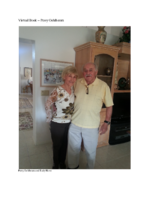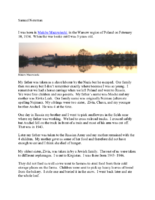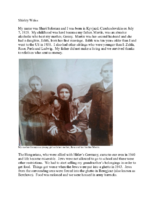Search the Special Collections and Archives Portal
Search Results

Biographical essay about Meta Doran, 2014
Date
Archival Collection
Description
Meta Doran's family was deported from Germany to Poland in 1938. She was sent to Auschwitz-Birkenau camp in 1944, where her mother perished.
Text

Biographical essay by Miriam Zaidman Borowsky, 2014
Date
Archival Collection
Description
Miriam Ziadman Borowsky's family moved from Palenstine to France in 1938, where her father surrendered to the Nazis and was sent to the Drancy internment camp. She recounts the rift in her family after she realized her father was not returning. Her essay includes photographs of her family and documents related to her father's military career.
Text

Biographical essay by Perry Oehlbaum, 2014
Date
Archival Collection
Description
Perry Oehlbaum describes her time in concentration camps in Germany and her liberation in 1945.
Text

Biographical essay by Rachel Taylor, 2014
Date
Archival Collection
Description
Rachel Taylor describes her family's experience during the Holocaust in Poland in the Kutno and Gubin ghettos. She was able to escape with her sisters and brother with the help of a Polish priest and nun, and her parents survived Auschwitz-Birkenau. Taylor came to the United Staes in 1961.
Text

Biographical essay about Raymonde Fiol, 2014
Date
Archival Collection
Description
Ray Fiol is the daughter of Holocaust victims who died at Auschwitz-Birkenau. Fiol was smuggled out a labor camp and protected by a French family during the war.
Text

Biographical essay by Rudy Horst, 2014
Date
Archival Collection
Description
Rudy Horst was a prisoner at Auschwitz and was part of the Death March from Warso to Kutno, then transported to Dachau. He was liberated from the camp at Muldorf in 1944. He came to the United States in 1948.
Text

Biographical essay by Ruth Stobin, 2014
Date
Archival Collection
Description
Ruth Stobin (nee Gottschalk) was able to escape Germany in 1939 with the kindertransport to England, and came to the United States in 1941.
Text

Biographical essay by Samuel Newman, 2014
Date
Archival Collection
Description
Samuel Newman describes his experience during the Holocaust and being separated from his siblings at different orphanages. He was in Kyrgyzstan from 1943 to 1946, and at an orphanage in Poland until 1951. Newman trained in graphic arts and spent some time in the military in Israel. He came to the United States in 1968.
Text

Biographical essay by Sasha Semenoff, 2014
Date
Archival Collection
Description
Sasha Semenoff survived several internment camps during the Holocaust, and ultimately recovered and became an entertainer in Las Vegas.
Text

Biographical essay by Shirley Weiss, 2014
Date
Archival Collection
Description
Shirley Weiss describes her childhood housed in army barracks in the ghetto in Beregszasz (Berehove), Hungary. She was sent to Auschwitz-Birkenau, and several other camps, and eventually liberated from Terez?n in 1945. She came to the United States via Sweden.
Text
